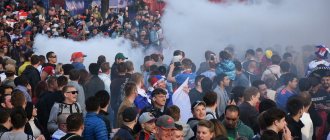Responsibility for petty hooliganism is established by the Code of the Russian Federation on Administrative Offenses. And the Criminal Code of the Russian Federation contains an article providing for criminal liability for hooliganism. Accordingly, the same actions, in the presence of certain signs, entail different levels of responsibility. What is petty hooliganism and what is the difference from such a crime as hooliganism? This will be discussed below. If you need to clarify any nuances, you can use the help of an on-duty lawyer.
What is petty hooliganism under Art. 20.1 Code of Administrative Offenses of the Russian Federation
Article 20.1 of the Code of Administrative Offenses of the Russian Federation calls petty hooliganism a violation of public order, which expresses clear disrespect for society, accompanied by obscene language in public places, offensive harassment of citizens, as well as destruction or damage to other people's property. There are also special formulations:
- actions were accompanied by disobedience to the legal demand of a representative of the authorities or a person ensuring the protection of public order
- dissemination on the Internet of information in an indecent form, expressing disrespect for society, the state, state symbols, authorities, insulting human dignity and public morality
- repeated commission of actions constituting an administrative offense of “minor hooliganism”
- committing an offense on the Internet more than 2 times.
The type of administrative penalty and its amount depend on how the authorized government body (jurisdiction of administrative affairs) qualifies actions. The sanction of the article provides for liability in the form of an administrative fine and administrative arrest.
Article 20.1 of the Code of Administrative Offenses of the Russian Federation in the current version
1. Petty hooliganism, that is, a violation of public order, expressing clear disrespect for society, accompanied by obscene language in public places, offensive harassment of citizens, as well as destruction or damage to someone else’s property, shall entail the imposition of an administrative fine in the amount of five hundred to one thousand rubles. or administrative arrest for up to fifteen days.
2. The same actions involving disobedience to the lawful demand of a government representative or other person performing duties to protect public order or suppress a violation of public order - shall entail the imposition of an administrative fine in the amount of one thousand to two thousand five hundred rubles or administrative arrest for a term of up to fifteen days.
3. Dissemination in information and telecommunication networks, including the Internet, of information expressing in an indecent form that offends human dignity and public morality, obvious disrespect for society, the state, official state symbols of the Russian Federation, the Constitution of the Russian Federation or bodies exercising state power in the Russian Federation, except for the cases provided for in Article 20.3.1 of this Code, if these actions do not contain a criminal offense - shall entail the imposition of an administrative fine in the amount of thirty thousand to one hundred thousand rubles.
4. Repeated commission of an administrative offense provided for in Part 3 of this article shall entail the imposition of an administrative fine in the amount of one hundred thousand to two hundred thousand rubles or administrative arrest for a term of up to fifteen days.
5. Actions provided for in Part 3 of this article, committed by a person who has previously been subjected to administrative punishment for a similar administrative offense more than twice, shall entail the imposition of an administrative fine in the amount of two hundred thousand to three hundred thousand rubles or administrative arrest for a term of up to fifteen days.
Note. The prosecutor's office of the Russian Federation is notified within twenty-four hours of all cases of initiation of cases of administrative offenses provided for in parts 3 - 5 of this article.
What is the difference between administrative and criminal liability for assault?
A big controversy, both between lawyers and within the public, was caused by changes in criminal and administrative legislation, after some types of beatings began to be classified as administrative offenses.
It would seem that Art. 6.1.1. Code of Administrative Offenses of the Russian Federation, and Art. 116 of the Criminal Code of the Russian Federation considers liability for beatings. But one article is criminal, and the second is administrative. In what cases does the perpetrator face criminal liability for beatings, and in which cases does he face administrative liability?
If the beatings were inflicted as a result of hooligan motives, national or racial hatred, then the attacker faces criminal liability (Article 116 of the Criminal Code of the Russian Federation). If, for example, the beating was inflicted on the victim as a result of a simple fight, then the perpetrator will face administrative liability (Article 6.1.1 of the Code of Administrative Offenses of the Russian Federation).
Administrative liability for beatings, both family and domestic, entails:
- imposition of a fine from 5 to 30 thousand rubles;
- administrative arrest from 10 to 15 days;
- or compulsory work for a period of 60 to 120 hours.
If we are talking about beatings in the family, then liability can be both administrative and criminal, depending on how many times the act was committed. So, if the beating was inflicted once, then the offender faces administrative liability under Art. 6.1.1. Code of Administrative Offenses of the Russian Federation, and if the victim was beaten once and he has already contacted law enforcement agencies with a statement, then the perpetrator faces criminal liability, and in this case, the act will be qualified under Art. 116.1 of the Criminal Code of the Russian Federation. This article also applies when committing a crime in the form of beatings against other (not close) persons, which is committed repeatedly. Also, it should be mentioned that the period of time during which a person previously subjected to administrative punishment will be subject to criminal liability is 1 year.
Administrative liability is provided for in the general case if there are no qualifying criteria. It should be noted that criminal liability under Art. 116 of the Criminal Code of the Russian Federation occurs only if beatings are committed for hooligan reasons or based on political, ideological, racial, national or religious hatred or enmity, or based on hatred or enmity towards any social group. For example, if two people expressed their disagreement to each other about the situation in the world and reinforced their dialogue with insults directed at the opposite address, then most likely this will be administrative responsibility if no other signs of a crime arise. But, if a person was beaten because, in the opinion of the opponent, his nation, for some reason, is worse than that of his interlocutor, then there is criminal liability. The sanction of the article in this case provides for penalties in the form of:
- compulsory work for up to 360 hours;
- corrective labor for up to 1 year;
- restrictions of freedom for up to 2 years;
- forced labor for up to 2 years;
- arrest for up to 6 months;
- imprisonment for up to 2 years.
Thus, it is necessary to distinguish between administrative and criminal liability for beatings. When qualifying an act, it is necessary to take into account in relation to which category of persons it was committed, establish the period of time during which the injuries were caused and the repetition of bringing the perpetrator to justice.
The draft article was prepared by a student of ChelSU, direction: “Legal support of national security”, specialty: lawyer, 5th year Mikhaleva N.A. under the leadership of the Chairman of the KSCA "Paritet" Vagin V.N.
Composition of the offense of “petty hooliganism”
The object of petty hooliganism is public order. That is, a system of relations between people, rules of behavior, including those established by morality, customs and traditions, ensuring the normal functioning of society and the state.
The objective side is only actions. Moreover, committed in certain places, called public places. What this is, the law does not decipher. Judicial practice follows the path that these are areas of terrain, structures, buildings, etc., intended for free (or for a fee) visit by citizens. Therefore, housing and individual development will not be a public place. And there will be an office building where services are provided to citizens.
Such actions are associated with clear disrespect for society. That is, violation of the rules established in society is demonstrative in nature. “Showdowns” with a neighbor based on personal hostility will not be petty hooliganism. But if the offender pursued the goal of disturbing public order, this is already petty hooliganism.
The subject is a citizen of the Russian Federation, a foreign citizen or a stateless person who has reached 16 years of age.
The subjective side of the offense has its own distinctive features. The motive for committing such actions as petty hooliganism is of paramount importance. And such actions can only be intentional (clear disrespect for society).
Differences between an offense and a crime
Article 213 of the Criminal Code of the Russian Federation establishes criminal liability for gross violation of public order, expressing clear disrespect for society. But at the same time, such actions involve the use of weapons or the threat of their use. Or on public transport. Or based on racial, national or other hostility or hatred. Or by prior conspiracy, with resistance to a government official, with the use or threat of using explosives.
As can be seen from the corpus delicti, hooliganism carries greater potential harm to legally protected relationships. Intent also matters here (to use weapons, explosives, etc.). It is by the degree of threat that petty hooliganism and hooliganism differ.
Obscene language
The use of obscenities means the use of rude words, curses and devalued vocabulary in speech. Unprintable swearing does not make a person beautiful, so each of us must monitor the frequency of our speech in public. The use of such words can negatively affect the moral principles of children who may be nearby at that moment, or violate established norms of public order.
Bringing to administrative liability under article
The police authorities begin to initiate a case of an administrative offense. Moreover, in the event of a repeated violation, as well as actions on the Internet, they notify the prosecutor's office of the Russian Federation within 24 hours. Just study the actions for the degree of threat to public danger.
Almost always, police authorities take interim measures. Delivery, personal search, administrative detention, etc. This is because the actions of the offender must first be stopped.
The procedure for bringing to administrative responsibility for committing an offense is general. The statute of limitations is general. But according to Part 3, Part 4 and Part 5 of Art. 20.1 of the Code of Administrative Offenses of the Russian Federation, the case is considered by the court. The police are considering materials regarding parts 1 and 2 of the article.
An appeal against a decision in a case of an administrative offense for petty hooliganism is carried out in accordance with the general procedure.
Public place
According to the norms of the Code of Administrative Offenses of the Russian Federation, public places include places with the right of unlimited general use by citizens. The list of such places includes:
- territories and buildings of government, social, cultural, etc. institutions;
- stadiums;
- transport (all types);
- parks and streets;
- train stations;
- hotels;
- markets and trading establishments;
- elevators in multi-storey buildings;
- beaches;
- Gas stations and other places of potentially large crowds of people.









